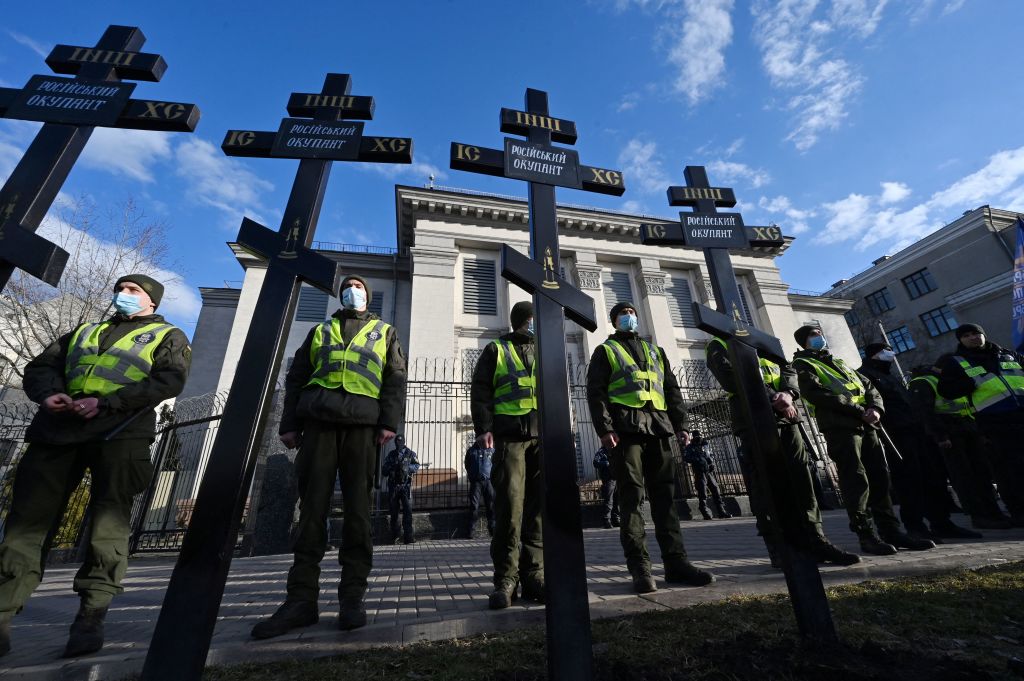Putin says the Minsk agreements, which aimed at peace in eastern Ukraine, no longer exist


A free daily email with the biggest news stories of the day – and the best features from TheWeek.com
You are now subscribed
Your newsletter sign-up was successful
Russian President Vladimir Putin told reporters on Tuesday that the Minsk peace deal no longer exists, BBC reports.
Putin was referring to a pair of agreements, signed in 2014 and 2015 in Minsk, Belarus, which were intended to end fighting between Ukrainian government forces and Russian-backed separatists in eastern Ukraine. Neither the initial Minsk Protocol nor the subsequent "Minsk II" agreement resulted in a lasting ceasefire, though many international observers continued to push for its full implementation as the best way of achieving peace.
Putin ordered Russian troops into eastern Ukraine late Monday after recognizing the independence of the separatist-controlled Donetsk People's Republic and Luhansk People's Republic, both of which are home to large Russian-speaking populations.
The Week
Escape your echo chamber. Get the facts behind the news, plus analysis from multiple perspectives.

Sign up for The Week's Free Newsletters
From our morning news briefing to a weekly Good News Newsletter, get the best of The Week delivered directly to your inbox.
From our morning news briefing to a weekly Good News Newsletter, get the best of The Week delivered directly to your inbox.
Both breakaway republics claim land currently controlled by the Ukrainian military, which could give Russian troops a pretext to launch attacks against Ukrainian forces, sparking an all-out war between the two nations.
In a speech announcing his decision, Putin said that "Ukraine for us is not just a neighboring country. It is an integral part of our own history, culture, spiritual space," according to a translation provided by The New York Times. He also claimed that Ukraine has "never had a tradition of genuine statehood" and that "[m]odern Ukraine was entirely created by Russia, more precisely Bolshevik communist Russia," according to Reuters. Therefore, Putin claimed, "decommunization" should have entailed the re-incorporation of Ukraine into Russia. "We are ready to show you what real decommunization means for Ukraine," Putin said.
A senior U.S. official told CNN that Putin's remarks were "meant to justify war."
A free daily email with the biggest news stories of the day – and the best features from TheWeek.com
Grayson Quay was the weekend editor at TheWeek.com. His writing has also been published in National Review, the Pittsburgh Post-Gazette, Modern Age, The American Conservative, The Spectator World, and other outlets. Grayson earned his M.A. from Georgetown University in 2019.
-
 The ‘ravenous’ demand for Cornish minerals
The ‘ravenous’ demand for Cornish mineralsUnder the Radar Growing need for critical minerals to power tech has intensified ‘appetite’ for lithium, which could be a ‘huge boon’ for local economy
-
 Why are election experts taking Trump’s midterm threats seriously?
Why are election experts taking Trump’s midterm threats seriously?IN THE SPOTLIGHT As the president muses about polling place deployments and a centralized electoral system aimed at one-party control, lawmakers are taking this administration at its word
-
 ‘Restaurateurs have become millionaires’
‘Restaurateurs have become millionaires’Instant Opinion Opinion, comment and editorials of the day
-
 What is ‘Arctic Sentry’ and will it deter Russia and China?
What is ‘Arctic Sentry’ and will it deter Russia and China?Today’s Big Question Nato considers joint operation and intelligence sharing in Arctic region, in face of Trump’s threats to seize Greenland for ‘protection’
-
 What would a UK deployment to Ukraine look like?
What would a UK deployment to Ukraine look like?Today's Big Question Security agreement commits British and French forces in event of ceasefire
-
 Would Europe defend Greenland from US aggression?
Would Europe defend Greenland from US aggression?Today’s Big Question ‘Mildness’ of EU pushback against Trump provocation ‘illustrates the bind Europe finds itself in’
-
 Did Trump just end the US-Europe alliance?
Did Trump just end the US-Europe alliance?Today's Big Question New US national security policy drops ‘grenade’ on Europe and should serve as ‘the mother of all wake-up calls’
-
 Is conscription the answer to Europe’s security woes?
Is conscription the answer to Europe’s security woes?Today's Big Question How best to boost troop numbers to deal with Russian threat is ‘prompting fierce and soul-searching debates’
-
 Trump peace deal: an offer Zelenskyy can’t refuse?
Trump peace deal: an offer Zelenskyy can’t refuse?Today’s Big Question ‘Unpalatable’ US plan may strengthen embattled Ukrainian president at home
-
 Vladimir Putin’s ‘nuclear tsunami’ missile
Vladimir Putin’s ‘nuclear tsunami’ missileThe Explainer Russian president has boasted that there is no way to intercept the new weapon
-
 The Baltic ‘bog belt’ plan to protect Europe from Russia
The Baltic ‘bog belt’ plan to protect Europe from RussiaUnder the Radar Reviving lost wetland on Nato’s eastern flank would fuse ‘two European priorities that increasingly compete for attention and funding: defence and climate’
